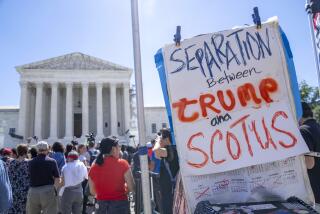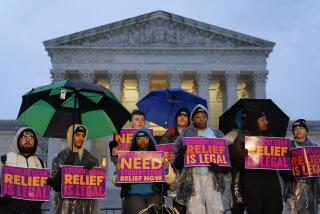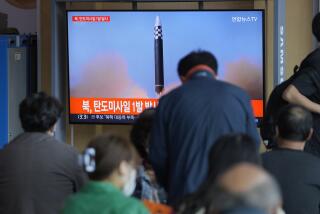The Ultimate Question
- Share via
From the opening gavel of the joint congressional hearings on the Iran/ contra affair, one question buried just below the surface of allother questions has been: How deeply was the President involved?
By President Reagan’s own account that is now less of an issue. By the same token, it is no longer quite so important whether he knew that profits from the sale of arms to Iran were diverted to the contra rebels who were trying to topple the Sandinista government or, in the old Watergate phrase, what he knew and when he knew it. Both have suddenly given way to the ultimate constitutional question: Is the President above the letter, or even the spirit, of the law?
Not by the law known as the Boland Amendment, said the President on his weekly radio broadcast last Saturday, speaking of a rider to an appropriations bill sponsored by Rep. Edward Boland (D-Mass.) that prohibited any agency of the government engaged in intelligence activity from spending money to support the contras.
“All I can tell you is that (the Boland Amendment) did not apply to the President,” echoed his chief of staff, Howard H. Baker, former senator from Tennessee, in a Sunday appearance on NBC-TV’s “Meet the Press.”
Both statements seem to be part of a swift reversal of earlier claims that the President knew little or nothing of the network of suppliers of arms and intelligence to the contras, directed from the White House National Security Council by Lt. Col. Oliver L. North, during a period in the mid-1980s when Congress certainly thought the law prohibited such a network.
The White House shift was not voluntary. But the position it took late last year when a supply plane was shot down over Nicaragua that there was “no (U.S.) government connection with it at all” was no longer tenable, not after testimony by Richard V. Secord, a former Air Force major general, who ran the shadow network, and certainly not after testimony by Robert W. Owen, a courier for North.
Owen, whose testimony concluded on Tuesday, was at once the most appealing and most appalling of all of the witnesses to show up on Capitol Hill so far, a true believer who saw himself as a foot soldier in the covert war to dislodge the Sandanistas from power in Managua.
As he has done before in the hearings, Sen. David Boren (D-Okla.), went beyond the trivia of how one binds together a covert operation to the larger question of propriety.
Having supported aid for the contras, Boren said, his quarrel was not with the “idealistic” ends that Owen pursued but with the means. “ . . . (If) we embark on a course in this country where everyone can do what they think is right without regard to the law, as strongly as they may feel about a particular course of policy, it’s a dangerous course.”
Americans have ignored the law in causes before--among them Martin Luther King Jr. who broke the law in the cause of civil rights and Thomas Paine, who had been invoked earlier in his testimony by Owen to illustrate how crucial the cause of the contras seemed to him. But King served time for breaking the law and Paine’s passionate cause was to break the autocratic power of a king and put such power in the hands of a republic. Besides, neither was President of the United States at the time.
Lawyers will continue to argue whether the Boland Amendment was as airtight as it might have been, but it is no longer possible to avoid the broader thrust of Boren’s question. No matter how just the cause, what happens to the United States if any citizen--including the President--feels above either the letter or the spirit of the law?
More to Read
Get the L.A. Times Politics newsletter
Deeply reported insights into legislation, politics and policy from Sacramento, Washington and beyond. In your inbox twice per week.
You may occasionally receive promotional content from the Los Angeles Times.










